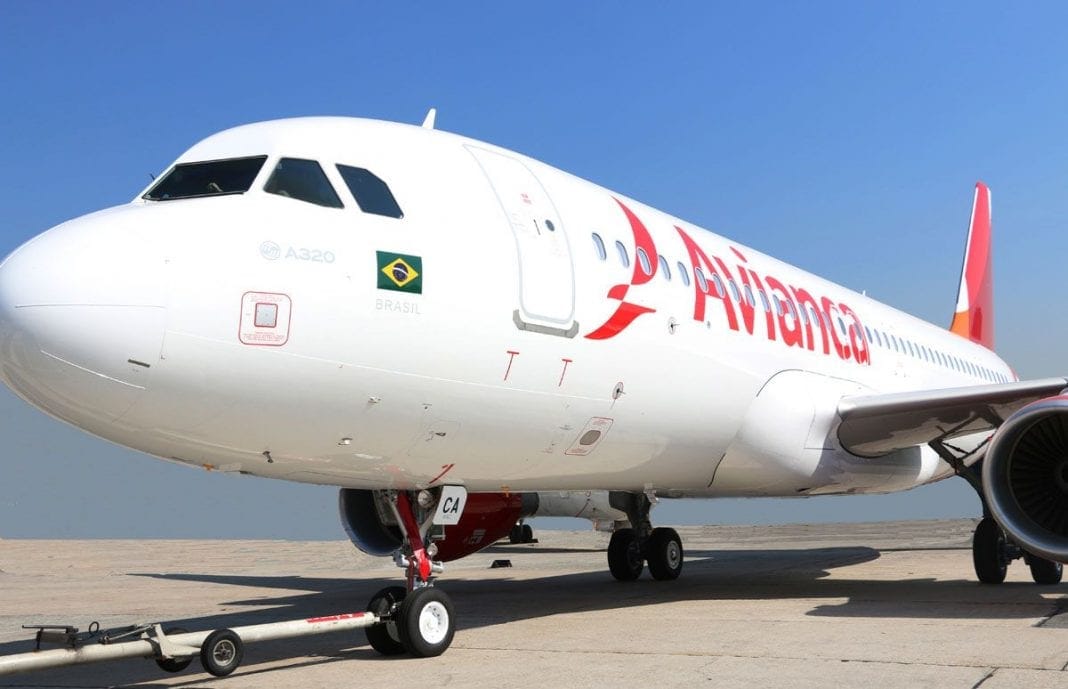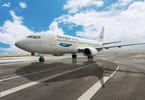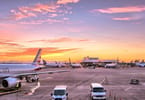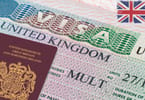Great inflight service and the UAE – USA open Sky agreement has been seen an essential reason for the success by Etihad Airways, Emirates Airlines and Qatar Airways to strengthen air links through airline hubs including Abu Dhabi, Dubai, and Doha to Africa, India and Asia.
Keep the Skies Open is the new slogan by Abu Dhabi airline Etihad Airways. Etihad is owned by the UAE government and considered the national carrier by this oil-rich country.
Etihad Airways came out with a bombshell today turning cards in US airlines accusing Gulf-based airlines of unfair competition due to government subsidies.
Etihad engaged an independent consulting firm, The Risk Advisory Group, and discovered the United States government had paid a total of $71.48 billion in taxpayers’ benefits to Delta Air Lines, United Airlines and American Airlines Group.
Etihad asked The Risk Advisory Group to perform a review of financial and other governmental benefits provided to American Airlines, Delta Air Lines and United Airlines. The group stated: “We were instructed to retain complete independence over the contents of our report and rely upon primary source materials, such as governmental records, litigation filings, annual reports and governmental and regulatory reports.
“We were instructed not to opine on the propriety of such financial or other governmental benefits, and this report makes no such judgments. The Risk Advisory Group is solely responsible for the contents of this report.”
The outcome of this report is a true bombshell: US airlines have received benefits valued at US$71.48 billion, more than US$70 billion of which has been since 2000, enabling the three US based largest carriers to transition from the verge of bankruptcy to today’s industry leaders, each achieving multi-billion dollar profits.
Last year, the three big US carriers generated collective a net profits of US$8.97 billion, equivalent to 45 per cent of the total US$19.9 billion profits achieved in 2014 by the global airline industry. The trend has continued into 2015, with all three major US airlines announcing strong net profits for the first quarter.
The Risk Advisory Group identified that the majority of benefits which accrued to Delta, United and American came from restructuring under Chapter 11 of the US Federal Bankruptcy Code, yielding them at least US$35.46 billion, and additional pension fund bailouts totalling US$29.4 billion from the US Government’s Pension Benefit Guaranty Corporation.
Etihad Airways has consistently denied claims by Delta Air Lines, United Airlines and American Airlines that it received subsidies, and has stated publicly that it has received equity and shareholder loans from its sole shareholder, the Government of Abu Dhabi, the largest emirate and capital of the UAE.
Releasing the findings by The Risk Advisory Group, the General Counsel and Company Secretary of Etihad Airways, Jim Callaghan, said today: “We do not question the legitimacy of benefits provided to US carriers by the US government and the bankruptcy courts.
“We simply wish to highlight the fact that US carriers have been benefitting and continue to benefit from a highly favorable legal regime, such as bankruptcy protection and pension guarantees, exemptions from certain taxes, and various other benefits. These benefits, which are generally only available to US carriers, have created a highly distorted market in which carriers such as Etihad Airways have to compete.”
Mr Callaghan said the figures produced by The Risk Advisory Group were conservative, quantifiable and credible, and obtained from public records and statements.
Mr Callaghan referred to a 2011 interview, published by America’s National Public Radio, in which a former Vice President of Continental Airlines, Pete Garcia, was quoted as saying: “Bankruptcy, for the airline industry in particular, is just a way to refinance the business. It is a financial move to keep you in business and give you time to renegotiate with your lenders.”
The Risk Advisory Group identified the largest beneficiaries of Chapter 11 restructuring and bailouts from the Pension Benefit Guaranty Corporation as:
– United Airlines, with combined benefits estimated at US$44.4 billion;
– Delta Air Lines with combined benefits estimated at US$15.02 billion; and
– American Airlines with combined benefits estimated at US$12.05 billion.
Of these figures:
– United achieved one-time bankruptcy debt relief totalling US$26 billion, and pension termination benefits totalling US$16.8 billion;
– Delta Air Lines achieved bankruptcy debt relief totalling US$7.9 billion, and pension termination benefits totalling US$4.55 billion; and
– American Airlines achieved bankruptcy debt relief totalling US$1.56 billion, and pension termination benefits of US$8.08 billion.
These figures include restructuring and bailout benefits achieved by other US airlines, since absorbed by Delta Air Lines, United Airlines and American Airlines.
Mr Callaghan said the current claims by United Airlines, Delta Air Lines and American Airlines that they were being harmed by Etihad Airways were baseless, and an attempt to obstruct higher-quality competition.
“There is no evidence whatsoever of any harm caused by Etihad Airways to any of the three big US airlines,” Mr Callaghan said.
“The US Open Skies policy has delivered more choice and better service for millions of consumers, more airline access to and from America, and record profits for the biggest airlines in the US. It is time to refocus on the real issue here – that the Open Skies policy is delivering the benefits it was designed to deliver, and that everyone is a winner.”
Etihad Airways began operations in 2003, and in 2014 carried 14.8 million passengers. From its Abu Dhabi base, Etihad Airways flies to or has announced 111 passenger and cargo destinations in the Middle East, Africa, Europe, Asia, Australia and the Americas.
The airline has a fleet of 116 Airbus and Boeing aircraft, and almost 200 aircraft on order, including 69 Boeing 787s, 25 Boeing 777-X, 62 Airbus A350s and eight Airbus A380s.
Etihad Airways has equity investments in airberlin, Air Serbia, Air Seychelles, Aer Lingus, Alitalia, Jet Airways and Virgin Australia, and is in the process of formalizing an investment in Swiss-based Darwin Airline, which trades as Etihad Regional.
Etihad Airways, along with airberlin, Air Serbia, Air Seychelles, Alitalia, Etihad Regional, Jet Airways and NIKI, also participates in Etihad Airways Partners, a new brand that brings together like-minded airlines to offer customers more choice through improved networks and schedules and enhanced frequent flyer benefits.
The Risk Advisory Group is a leading independent global risk consultancy that helps businesses grow whilst protecting their people, their assets and their brands. By providing facts, intelligence and analysis, The Risk Advisory Group helps its clients negotiate complex and uncertain environments to choose the right opportunities, in the right markets, with the right partners. The company was founded in 1997, employs 140 people and has offices in Washington DC, London, Moscow, Al Khobar, Dubai and Hong Kong.
The following information is provided by the The Risk Advisory Group in regards to the report
Methodology
The report consists of a detailed summary of a program of research undertaken. In conducting our research we retrieved and analyzed documents and information filed electronically and in hard copy from the following types of sources:
Primary sources
– official government records
– audited annual reports by airlines
– reports prepared by relevant regulators
– reports prepared by supranational bodies such as the European Commission
Secondary sources
– academic studies and literature
– recognized aviation industry trade publications
– Media reports from reputable publications, such as Financial Times, The Economist and others
– Secondary literature on the aviation industry
The figures in our report have been provided on the basis of attributable sources. In every case we have cited the reference for our findings, giving preference to primary sources and citing secondary sources only in circumstances where we could not obtain the same data from a relevant primary source. We did not conduct any interviews in preparing this report.
For the purpose of this report, we refer to American Airlines, Delta Air Lines and United Airlines as they are currently configured. Thus, while some of the figures provided include data from Northwest Airlines and US Airways, they are included under Delta Air Lines and American Airlines, respectively.
US carriers: jet fuel tax (Federal)
US federal tax on jet fuel is levied at a lower rate when that fuel is for commercial aviation: non- commercial carriers are taxed at 21.9¢ per gallon while commercial carriers are taxed at 4.4¢ per gallon.9 The discounted federal rate of tax on jet fuel is not exclusive to US airlines – it is levied on all carriers at the same rate.
The US Bureau of Transportation provides data on jet fuel purchased by the three major carriers in the period from January 2009 until September 2014.10 Applying the discounted rate of federal tax, our calculations indicate that the carriers have made the follow savings during that period11:
• Delta Air Lines: $1.7 bn
• American Airlines & US Airways: $2.3 bn • United & Continental Airlines: $1.6 bn
US carriers: jet fuel tax (State)
State governments levy taxes on jet fuel at a different rate from the federal rate. The Tax Foundation has collated state jet fuel tax rates.12 We have calculated the average state tax rate as 7.7¢ per gallon for commercial carriers and analyzed jet fuel tax policies in the states in which the three principal US carriers are headquartered:
• Delta Air Lines is headquartered in the state of Georgia. Legislation enacted by the Georgia General Assembly in 2005 exempts all commercial carriers from state jet fuel taxes.13 Georgia State Representative Earl Ehrhardt is currently leading an effort to remove this tax exemption, which is reported to be worth an estimated total between $21 and $23 mn to commercial carriers each year.14
• American Airlines is headquartered in the state of Texas, where there has been no state tax on jet fuel since at least 2009.15 The US Energy Information Administration (EIA) compiles total jet fuel consumption data by state.16 Using available EIA consumption data for the state of Texas and the average tax rate (7.7¢) as a base of comparison, we estimate that carriers operating in Texas received a total discount of $5.3 mn during 2013. Further analysis of a wider data set may identify further benefits derived by the carriers.
• United Airlines is headquartered in the State of Illinois. The current state jet fuel tax in Illinois of 32.75¢ per gallon is the highest in the US. However, carriers have been exempt from paying the standard rate for all international flights since at least 2003.17 Similarly, all carriers have been exempted from environmental impact fees since 1996.18
US carriers: miscellaneous benefits
We have undertaken a preliminary review of domestic incentive programs involving the three US carriers:
American Airlines / US Airways
• American received between $80-85 mn subsidy from the State of Missouri in 2003 to help fund the redevelopment of a facility in the state.19
• Pennsylvania state and local governments provided an additional $26.25 mn incentive package for US Airways to build an operations center in Allegheny County in 2008.20
• In Texas, the Fort Worth City Council created a $6.5 mn tax incentive in 2014 for American Airlines’ operations center in the city.
• US Airways received fuel tax refunds from North Carolina in 2012 and 2013, amounting to $16.6 mn and $9.2 mn.
United Airlines / Continental
• Colorado’s Office of Economic Development and International Trade reportedly provided $6.29 mn in tax credits to United in 2011 and 2012.
Delta Air Lines / Northwest
• Minnesota state records indicate that Northwest Airlines received a $838 mn financing package from the state in 1991 which was reduced to $761 mn in 1992. Northwest apparently used this sum to build fleet maintenance facilities in the state. The package included a $270 mn loan from the Metropolitan Airports Commission and nearly $500 mn in construction financing with terms varying during Northwest’s financial difficulties.
• The Commonwealth of Pennsylvania’s Community and Economic Development Department granted $30 mn in 2012 to Monroe Energy, a wholly owned subsidiary of Delta Air Lines, according to press releases issued by Delta Air Lines and the Pennsylvania Office of the Governor.
US carriers: miscellaneous benefits – government bonds United Airlines / Continental
• Indiana’s Transportation Finance Authority issued bonds for $369 mn to finance United Airlines’ construction of a maintenance facility at Indianapolis International Airport in 1991. An article from 2003 alleged further funding had been provided by local government authorities prior to the facility’s premature closure.
• The City of Chicago provided $24.38 mn in tax financing to United for its involvement in an urban renewal project in 2009, in addition to $5.475 mn it provided for a similar project in 2007.
American Airlines / US Airways
• Between 2002 and 2012, the New York City Industrial Development Agency and Trust for Cultural Resources and Build NYC issued $1.3 bn in bonds to finance a new American Airlines Terminal at JFK airport, according to the New York Citizens Budget Commission.
US carriers: domestic market protectionism
International carriers are forbidden from flying point-to-point destinations within the US. Quantifying the commercial benefit derived by US carriers from this domestic market protectionism is extremely difficult.
US carriers: Fly America Act
Enacted by Congress in 1995, the Fly America Act mandates that government-paid international air travel be performed by US carriers or those operating under a codeshare agreement. The law has its origins in the International Air Transportation Fair Competitive Practices Act of 1974.
It is difficult to quantify the amounts generated via this program for American Airlines, Delta Air Lines and United Airlines, due to the absence of reliable data.
US Carriers: State-owned alliance partners
American Airlines, United Airlines and Delta Air Lines are members of airline alliances. Each of these alliances includes airlines that are partially or wholly-owned by governments. Specifically:
• SkyTeam, the 20 partner alliance to which Delta belongs, has 10 members that are at least partially state-owned: Aeroflot, Aerolíneas Argentinas, China Airlines, Czech Airlines, Garuda Indonesia, Middle East Airlines, Saudia, TAROM, Vietnam Airlines
• Oneworld, the 15 partner alliance to which American Airlines belongs, includes five members that are at least partially state owned: Finnair, Royal Jordanian, SriLankan Airlines, Cathay Pacific and Qatar Airways
• Star Alliance, the 27 partner alliance to which United belongs, includes 11 members that are at least partially state-owned: Adria Airways, Air China, Air India, Air New Zealand, Croatia Airlines, EgyptAir, Ethiopian Airlines, LOT Polish Airlines, Singapore Airlines, South African Airways and Thai Airways International
In a number of cases, these government-owned alliance partners have enjoyed significant benefits, including direct financial support, from their governments and other associated government-owned entities.
US Carriers: Miscellaneous benefits under $5 mn
• Newark City, New Jersey reportedly provided grants to Continental in both 1997 and 2000, amounting to $753,900 and $1.34 mn, respectively, according to the New Jersey Economic Development Authority.
• Delta Air Lines received $3.5 mn from the Port of Portland in 2009, according to a PricewaterhouseCoopers annual audit in 2010.
• The Commonwealth of Pennsylvania exempted US air carriers from state sales tax on airline food in 2001, primarily benefiting US Airways, which operated hubs in the state. This amounts to an estimated value of $3.5 mn per year.
WHAT TO TAKE AWAY FROM THIS ARTICLE:
- Etihad Airways has consistently denied claims by Delta Air Lines, United Airlines and American Airlines that it received subsidies, and has stated publicly that it has received equity and shareholder loans from its sole shareholder, the Government of Abu Dhabi, the largest emirate and capital of the UAE.
- The Risk Advisory Group identified that the majority of benefits which accrued to Delta, United and American came from restructuring under Chapter 11 of the US Federal Bankruptcy Code, yielding them at least US$35.
- Etihad asked The Risk Advisory Group to perform a review of financial and other governmental benefits provided to American Airlines, Delta Air Lines and United Airlines.






















